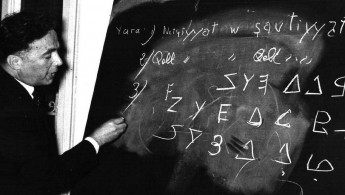'Phoenician poet' Said Akl dies, aged 102
Born in Zahle in Lebanon in 1912, Akl wrote hundreds of poems in both classical Arabic and Lebanese dialect. His work reached a wide audience after the Lebanese Rahbani brothers turned them into songs, which were sung by Fairuz - the Arab world's ultimate superstar.
Many of his colloquial poems were published in a book entitled Yara (1961). They are among the most widely circulated ghazaliyyat, a form of rhyming poetry that expresses beauty, love, and pain, and which is often set to music.
| His work was turned into songs by the Rahbani brothers that were sung by Fairuz - the Arab world's ultimate superstar. |
Akl had been writing poetry and musicals since the 1930s. His first play was called Bint Yifta'h, though he achieved fame with his next production - a historical musical named Fakhr al-Din - and later productions such as Cadmus, which took its name from a Phoenician legend.
Although Akl began his career as a poet, his plays were published before his poetry. His first book of poetry was Almajdaliyyah ["Magdalene"], written in 1937. He followed it with Rindalah, Ajras al-Yasameen ["Jasmine bells"], Dulza, and Qasa’id Min Daftariha ["Poems from her notebook"].
Akl studied theology at Holy Spirit University on Mount Lebanon, and gave lessons at the Saint Anthony Institute in Beirut. He also wrote religious poetry.
Initially, he was an advocate of Syrian nationalism before clinging to ideas of Lebanese patriotism.
One of the problematic issues surrounding his career was his call for Lebanon to abandon the Arabic language, and for the Arabic alphabet to be replaced with a Latin-based one.
|
Watch a 1976 performance of Fairuz singing Akl's song, |
Although modern standard Arabic gave Akl a rich and beautiful language, and was largely responsible for his fame and glory as a poet, he renounced it later in life.
He declared that if he had time he would translate all his work from modern standard Arabic to the Lebanese dialect exclusively using a Latin-based alphabet.
Akl never did not carry out his threat. He must have realised the literary value of the poetry he had written in standard Arabic, a language that enabled him to write innovative sentences and evoke unique imagery turning him into an Arab poet par excellence.
This growth happened despite his efforts to associate himself with the Phoenician identity - and he wrote a collection of poetry in French. However, it was the Arabic language alone that glorified Akl, making him one of the most prominent poets in the Arab world.
Akl was undoubtable a controversial figure, especially because of the radical position he took towards the Palestinians in Lebanon. His views became more disturbing when he welcomed the Israeli army's invasion in 1982.
However, his old poems expressed a different message: "Oh my voice, continue to fly, storm these minds, tell them about what's happening here, perhaps their conscience will awaken."
It is as if the Lebanese civil war transformed Akl, taking him to unexpected places and turning him into a different person.
This article is an edited translation from our Arabic edition.



